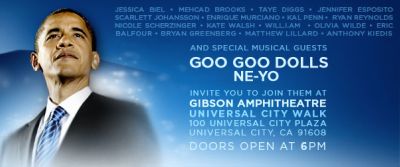
Some belated observations on my recent brush with Obamamania: I caught Barack Obama in Los Angeles Monday night when he spoke to around 4,000 people in Universal Studios’ Gibson Amphitheatre. His campaign had promised a star-studded evening, though it was clear that the celebs listed on the program were there to be seen with him, not vice versa. Obama’s star power, or at least his aura of novelty, seemed to be the main draw for many in the crowd, myself included. (OK, I also hoped to see Scarlett Johansson.) A fiftyish black woman next to me in the security line said she was a “curiosity seeker,” not inclined to vote for Hillary Clinton, but clearly hoping that seeing Obama in person might seal the deal. Whatever people’s reasons for lining up on this unusually chilly evening, the audience demographics highlighted one of the greatest arguments for Obama’s viability in the primaries and beyond. It was a remarkably diverse group, both in race and age. The $25 student tickets probably helped keep the average age down, but the $250 VIP section wasn’t all Boomers, either.
The opening acts were made slightly less tedious by the availability of overpriced french fries, chicken nuggets, and beer. (This was Universal Studios, after all.) The head of Obama’s LGBT outreach team kicked off the event by making a lot of obvious references to “triangulation” and describing Obama as “a circle that embraces.” He was followed by Los Angeles city council president Eric Garcetti, who dubbed the crowd the “Obama nation,” a potentially misconstrued phrase that the campaign would be wise to ban ASAP. Next up were Dancing With the Stars’ Giselle Fernandez, the endearingly earnest Kal Penn, and 81-year-old actor James Whitmore, who assured us with Greatest Generational gravitas that Obama was imbued with “wisdom” beyond his years. Ne-Yo busted out his Smooth Criminal dance moves, and the Goo Goo Dolls’ bassist kept me amused with his Dewey Finn impersonation. The openers didn’t bring much glitz (hey, where was Scarlett, anyway?), but that was incidental to their role in reinforcing Obama’s broad appeal.
Finally: Obama. He was good, very good. For a half-hour, he stood tie-less in the bright lights of the catwalk, speaking without notes, delivering a surprisingly extemporaneous-feeling stump speech. Although it never felt canned, it fell short of electrifying. Which isn’t to say that the crowd didn’t go nuts, cheering and delivering standing Os with increasing frequency until the whole speech felt like one big applause line. Obama obliged them with a mix of feel-good lines and big, soaring crescendos of optimism and hope. He tried out some new material, remarking at his large crowds of late, “After Oprah, that’s a whole other story.” He quipped that it’s “an embarrassing thing being related to Dick Cheney.” And he riffed on the Clinton campaign’s attempt to dig up his kindergarten writings, mock-confessing, “I experimented with coloring outside the lines. And I pulled a girls’ pigtail—and liked it.”
Obama made some big promises, such as bringing health coverage to all Americans by the end of his first term, ending the Darfur genocide, tying the minimum wage to the cost of living, and shunning “corporate” lobbyists: “They have not funded my campaign. They will not work in my White House.” And, of course, he reiterated his call to get out of Iraq in 16 months. One of the more notable moments was his inclusion of “nonbelievers” in a line recognizing Americans’ religious diversity, a subtle retort to the GOP frontrunners’ Bible-thumping. There were a couple moments of real passion, such as when he mentioned his experience as an organizer in his twenties, and recalled a recent day spent shadowing an overworked, underpaid home health-care worker. He wrapped up by simultaneously defending himself from accusations of callowness and by putting She Who Must Not Be Named in her place. He said he didn’t feel he was “owed” the Oval Office, yet believed that there was no better time for him to take it, given—in the words of Martin Luther King Jr.,—”the fierce urgency of now.”
I’d hoped that he would speak longer, both because it was enjoyable to watch a speaker so natural and because I was waiting for some policy specifics that never came. (I suppose it was too much to expect an explanation of why he would not require health insurance for adults, for instance.) I didn’t see anything that distinguished Obama’s positions from those of his Democratic rivals, but I was left with a strong sense that he could mix things up in an interesting way. That, of course, is a big part of Obama’s pitch—that a fresh face is what his party and the nation need most. Which makes “the fierce urgency of now” a compelling argument for supporting him, particularly among Democrats who dread the timewarp that could be a Clinton candidacy (and presidency). But within the urgency argument is a suggestion that Obama has a looming sell-by date. (Conversely, Hillary Clinton’s impressive political shelf-life suggests she is packed to the gills with preservatives.) It’s an unintentional suggestion, to be sure, but it makes his greatest strength sound like a potential weakness. I’m not suggesting that he lacks substance or seriousness—far from it. But I came away from the movie-studio event thinking he’d be wise to anticipate the day when his celebrity is no longer enough to convert curiosity seekers into true believers.

















